
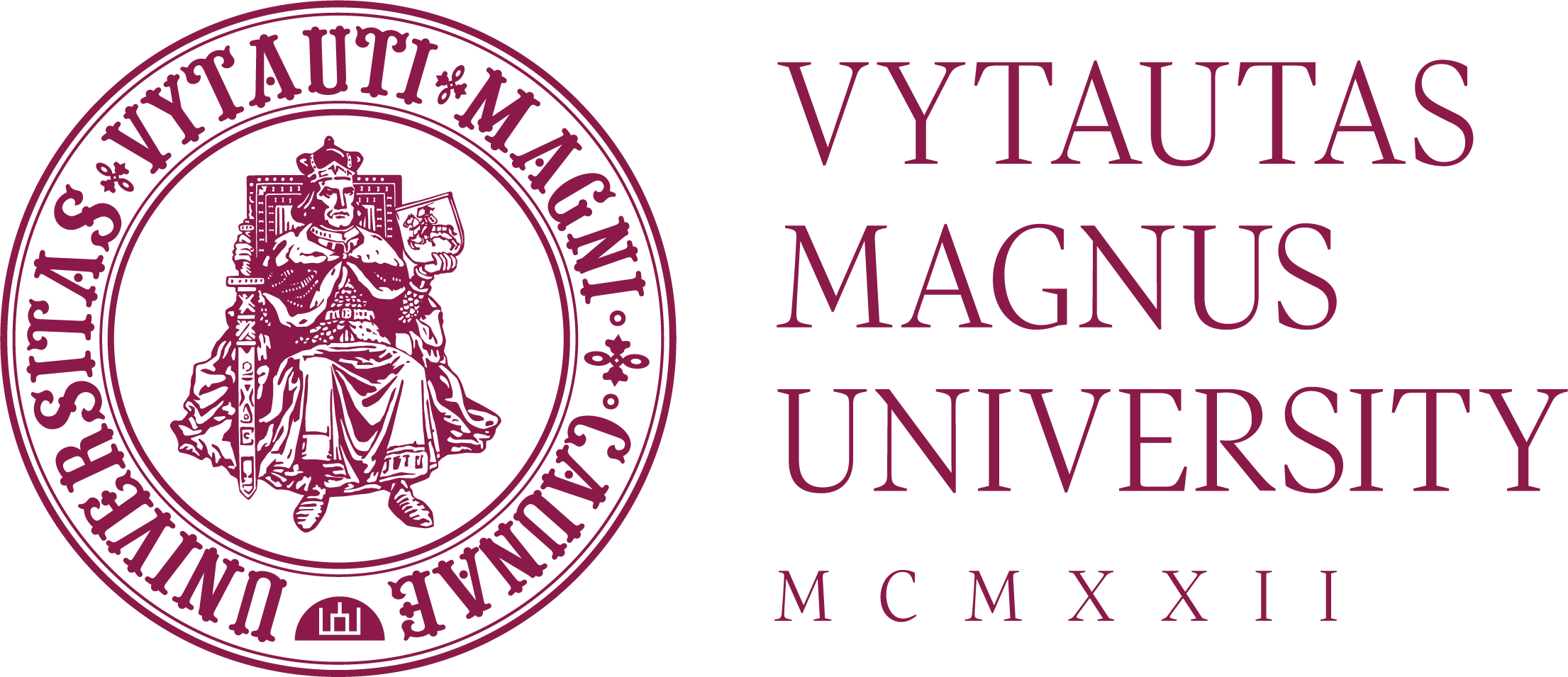
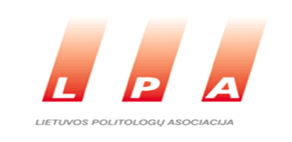
28th Annual Conference of Central European Political Science Association (CEPSA)
“TWENTY YEARS OF EU MEMBERSHIP: LESSONS LEARNED, CHALLENGES AND OPPORTUNITIES”
Thursday 3rd – Friday 4th of October 2024, Kaunas
Organized by
Central European Political Science Association in cooperation with Vytautas Magnus University, Faculty of Political Science and Diplomacy and Lithuanian Political Science Association
PROGRAMME
2024-09-19
Conference venue:
Vytautas Magnus University Faculty of Political Science and Diplomacy,
V. Putvinskio str. 23, LT-44243 Kaunas, Lithuania
Organizing Committee:
- Ingrida Unikaitė-Jakuntavičienė, Chair of the committee, Vytautas Magnus University, Lithuania
- Miro Haček, President of CEPSA, University of Ljubljana, Slovenia
- Petr Just, General Secretary of CEPSA, Metropolitan University Prague, Czech Republic
- Sima Rakutienė, Vytautas Magnus University, Lithuania
- Aistė Žemaitytė, Vytautas Magnus University, Lithuania
- Rimgailė Kasparaitė, Vytautas Magnus University, Lithuania
- Robertas Eismontas, Vytautas Magnus University, Lithuania
- Liutauras Gudžinskas, acting President of the Lithuanian Political Science Association, Vilnius University, Lithuania
Programme
1ST DAY
THURSDAY, 3RD OF OCTOBER, 2024
8.30.-9.30 Registration of participants (VMU, Lobby of the Faculty of Political Science and Diplomacy building, Putvinskio st. 23, 1st floor)
9.30- 10.45 Opening ceremony (VMU, Putvinskio st. 23, 1st floor, Room 106) :
-Welcoming speeches: Vytautas Magnus University Vice-Rector for Communication Vilma Bijeikienė; VMU Dean of the Faculty of Political Science and Diplomacy Šarūnas Liekis; CEPSA President Miro Haček
–Keynote speech: “No Country for Eurosceptic Men? Transformation and Europeanisation of Lithuania” Prof. Mindaugas Jurkynas (VMU, Faculty of Political Science and Diplomacy)
10:45-11:15 Coffee break (Room 414)
The following panel sessions will be held in the building of the Faculty of Political Science and Diplomacy of VUM (V.Putvinskio str. 23). Registration desk will be available during the session after the lunch at the entrance to the Faculty building.
| 10:45-11:15 Coffee break (Room 414) | ||
| 11:15-12:45 Session I | Panel 1 | Room 106 |
| 11:15-12:45 Session I | Panel 2 | Room 002 |
| 11:15-12:45 Session I | Panel 3 | Room 312 |
| 11:15-12:45 Session I | Panel 4 | Room 313 |
| 11:15-12:45 Session I | Panel 5 | Room 311 |
| 11:15-12:45 Session I | Panel 6 | Room 220 |
| 12.45-14.30 | Lunch Break | |
| 14.30 -16.00 Session II | Panel 7 | Room 106 |
| 14.30 -16.00 Session II | Panel 8 | Room 220 |
| 14.30 -16.00 Session II | Panel 9 | Room 002 |
| 14.30 -16.00 Session II | Panel 10 | Room 311 |
| 14.30 -16.00 Session II | Panel 11 | Room 312 |
| 16.00-16.15 | Coffee Break (room 414) | |
| 16.15-17.45 Session III | Panel 12 | Room 106 |
| 16.15-17.45 Session III | Panel 13 | Room 312 |
| 16.15-17.45 Session III | Panel 14 | Room 311 |
| 16.15-17.45 Session III | Panel 15 | Room 002 |
| 16.15-17.45 Session III | Panel 16 | Room 220 |
| 17.45-17.50 | Break | |
| 17.50-19.20 Session IV | Panel 17 | Room 106 |
| 17.50-19.20 Session IV | Panel 18 | Room 313 |
| 17.50-19.20 Session IV | Panel 19 | Room 311 |
| 17.50-19.20 Session IV | Panel 20 | Room 312 |
| 17.50-19.20 Session IV | Panel 21 | Room 002 |
| 18.00-19.00 | CEPSA Council meeting | Room 220 |
| 19.30 Reception for conference participants (Room 414 and terrace) | ||
2ND DAY
FRIDAY, 4TH OF OCTOBER, 2024
The following panel sessions will be held in the building of the Faculty of Political Science and Diplomacy of VUM (V.Putvinskio str. 23). Registration desk will be available from 9 a.m. to 11 a.m. at the entrance to the Faculty building.
| 9.15-10.45 Session V | Panel 22 | Room 311 |
| 9.15-10.45 Session V | Panel 23 | Room 313 |
| 9:15-10:45 Session V | Panel 24 | Room 002 |
| 9:15-10:45 Session V | Panel 25 | Room 312 |
| 9:15-10:45 Session V | Panel 26 | Room 310 |
| 10.45-11.15 | Coffee Break | |
| 11.15-12.45 Session VI | Panel 27 | Room 311 |
| 11.15-12.45 Session VI | Panel 28 | Room 310 |
| 11.15-12.45 Session VI | Panel 29 | Room 312 |
| Closing of the conference | ||
Pannels
THURSDAY
3rd of October, 2024
| Panel 1.
Room: 106 |
Experiences and perspectives of CEE countries in the EU
Panel chair: Assoc. prof. Sima Rakutienė, Vytautas Magnus University |
||
| Experiences and perspectives of the Visegrad Group in the European Union | Anna Czyż | University of Silesia in Katowice | |
| Twenty Years After EU Accession: Assessing Slovenian Experience | Miro Haček | University of Ljubljana | |
| Examining EU Leverage and Linkage in Hampering De-democratization in Central Europe | Łukasz Zamęcki | University of Warsaw | |
| Twenty years of Slovakia in the European Union – challenges and expectations | Peter Csanyi | University of Economics in Bratislava | |
| The “second dimension” in Central Europe: a demand-side approach | Jan Kovář | Institute of International Relations Prague | |
| Panel 2.
Room:002 |
Security and Defence Policy Processes in Transatlantic Security Community and Their Implications to The Baltic States 1
Panel chair: prof. Giedrius Česnakas, General Jonas Zemaitis Military Academy of Lithuania |
||
| The U.S. Position Regarding NATO Transformation: A Return To The Original Mission With A Stronger European Role In The Alliance” | Gerda Jakštaitė-Confortola | General Jonas Zemaitis Military Academy of Lithuania | |
| Deteriorating security environment and NATO collective defence adaptation | Ieva Karpavičiūtė | General Jonas Zemaitis Military Academy of Lithuania | |
| Analyzing the European Defence Fund’s financing distribution across EU countries: what drives national participation in defence-industrial integration projects? | Ringailė Kuokštytė | General Jonas Zemaitis Military Academy of Lithuania | |
| The strongest land army in Europe? The development of Polish Armed Forces in the context of Russian war on Ukraine and the EU plans of creating European Army | Łukasz Stach | Jagiellonian University | |
| The Big Game in Southeast Europe: Groupism and Anarchy in Russo-Western Relations | Davor Boban | University of Zagreb | |
| Panel 3.
Room: 312 |
Experiences and Perspectives of EU Enlargement and Integration processes
Panel chair: Laura Gheorghiu, Karl Franzens University Graz |
||
| Perspectives for Further Enlargement of the EU in the Light of Current V4 Positions | Boglárka Koller | Ludovika University of Public Service, Budapest | |
| “Is the V4 the growth engine of Europe? 20 years of convergence within the | Gál, Zoltán | University of Pécs | |
| “Welcome Aboard?” Assessing and Explaining Absenteeism of Member States in the Union’s Cultural Project Funding Sphere | Birgit Mitter and Armin Mühlböck | University of Salzburg | |
| Ride-or-die until EU accession? Examining the support for EU integration among Albanians in North Macedonia | Ferenc Németh | Corvinus University of Budapest | |
| Shifting identities: EU integration in Moldova and Bosnia-Herzegovina | Petra Bezděková
Damir Kasum |
Palacký University Olomouc | |
| Panel 4.
Room: 313 |
Democracy backsliding in Central and Eastern European EU member states
Panel chair: Assoc. prof. Adam Szymański, University of Warsaw |
||
| From posterchild to pariah of the EU Illiberal unpolitics in Hungary | Robet Sata | Central European University | |
| Democratic backsliding and non-participation: Cross-European analysis | Algis Krupavičius,
Ligita Šarkutė |
Mykolas Romeris University,
Vytautas Magnus University |
|
| European Values in the 21st Century: Longitudinal Analysis of the State of (Liberal) Democracy in EU Member States | Dario Čepo | University of Zagreb | |
| Hungarian and Polish parliaments as tools of democratic backsliding in the hands of Fidesz and Prawo i Sprawiedliwość | Sebastian Kubas | University of Silesia in Katowice | |
| What Shapes Affective Political Polarisation in the Czech Republic? | Pat Lyons | Czech Academy of Sciences | |
| Panel 5.
Room: 311 |
Foreign policy perspectives in Central Europe
Panel chair/-s: Prof. Jaroslav Ušiak, Matej Bel University in Banská Bystrica, Slovakia; Dr. Péter Rada, Budapest Metropolitan University, Hungary |
||
| Dynamics of Visegrad Group Cooperation in Foreign and Security Policy Post-Ukraine Conflict | Jaroslav Ušiak | Matej Bel University in Banská Bystrica | |
| SurRealism of the Liberal World Order and the Place of the EU in its Future | Péter Rada | Budapest Metropolitan University | |
| State Strategy Planning and Regional Cooperation in Security Policy | Laura Nyilas | National University of Public Service | |
| 25 years of Poland, the Czech Republic and Hungary in NATO | Ewelina Kancik-Kołtun | Maria Curie-Skłodowska University | |
| Foreign and Defence Policy Issues in the 2023 Czech and the 2024 Slovak Presidential Elections | Petr Just | Metropolitan University Prague | |
| The Influence of Realist and Constructivist Perceptions of National Interest on Foreign Policy Priorities: A Case Study of Serbia | Nikola Jović, Milan Krstić, Marko Dašić | University of Belgrade | |
| Panel 6.
Room: 220 |
European Parliament Elections in CEE countries
Panel chair: Assoc. prof. Ingrida Unikaitė-Jakuntavičienė, Vytautas Magnus University |
||
| The EP Elections 2024 – Campaign Strategies of Austrian Parties and the Role of Social Media | Karin Liebhart | University of Vienna and University of Trnava | |
| New political parties in the EP elections 2004-2024: the Czech experience | Daniel Sarovec | Jan Evangelista Purkyne University | |
| 2024 EP elections in Lithuania: campaigning of Lithuanian Parties in between European and National Issues | Ingrida Unikaitė-Jakuntavičienė | Vytautas Magnus University | |
| The Prospects of Christian democratic parties in CEE Countries in light of the 2024 European Parliament Elections | Ádám Darabos | Research Institute for Religion and Society, Eötvös József Research Centre, University of Public Service, Danube Institute | |
| Examining The Influence of Migration On Decision-Making Processes Within The EU in The Context Of The 2024 European Parliament Elections: Insights From The Polish Perspective”. | Eugeniusz Kuznicow-Wyszyński | University of Warsaw | |
| Participatory European Parliament manifesto writing: just a tool or a value choice? | Richard Bavlsík, Ákos Nagy, Daniel Oross | Corvinus University of Budapest, HUN-REN Centre for Social Sciences | |
Lunch break
| Panel 7.
Room: 106 |
IPSA RC13 – Democratization in comparative perspective
Belarusians amidst regional and national turbulences in post-2020 times
Panel chair: prof. Irmina Matonytė, Military Academy of Lithuania Discussant: Siarhei Liubimau, European Humanities University |
||
| Post-2020 Belarus: mnemonic conflict in history interpretation amid the liquidation of the remnants of independent civil society | Hanna Vasilevich | International Centre for Ethnic and Linguistic Diversity Studies, Prague | |
| Decolonial Slavic (un)coupling? EU politicians’ views on the Belarusian and the Russian oppositions-in-exile and their reception | Pierson-Lyzhina, Ekaterina; Buyantueva, Radzhana | Repi of Université libre de Bruxelles; Cevipol of Université libre de Bruxelles | |
| Exiled Belarusian civil society in the context of war in Ukraine | Tatsiana Chulitskaya | Vilnius University | |
| Everyday life under authoritarianism: A case study of Belarus after the 2020-21 National Awakening | Katsiaryna Lozka | Ghent Institute for International and European Studies (GIES), | |
| The Litvinism Debate as a Barrier for Belarus-Lithuania Cooperation towards Democracy | Vadim Vileita | Independent analyst, Vilnius | |
| Panel 8.
Room: 220 |
Security of European nations in the era of hybrid threats: concepts, strategies and practices
Panel chair: Assoc. prof. Robert Mikac, University of Zagreb |
||
| Hybrid threats and challenges to the Western Balkans states
|
Robert Mikac | University of Zagreb | |
| Hybrid threats to the European Union: Instrumentalisation of the anti-EU agenda in disinformation campaigns | Miroslav Mareš | Masaryk University | |
| The Interconnection of Internal and External Security Concepts: Lithuania’s Societal Resilience against Hybrid Threats | Ieva Gajauskaitė | Military academy of Lithuania | |
| Civic education as a countermeasure to hybrid threats: the case of Latvia | Ieva Bērziņa | Vidzeme University of Applied Sciences, National Defence Academy of Latvia | |
| Hybrid threats and security challenges to Estonia and Estonian countermeasures | Vladimir Sazonov | University of Tartu, Estonian Military Academy | |
| Panel 9.
Room: 002 |
War, refugee movements and their political implications after the 2022 Russian invasion of Ukraine 1
Panel chair/-s: Dr. Bartosz Czepil, University of Opole, Poland; Prof. Jarosław Jańczak, Adam Mickiewicz University, Poland, European University Viadrina, Germany |
||
| In the aftermath of the war in Ukraine: Migration crisis and its geopolitical implications for Poland | Tomasz Brańka, Łukasz Donaj | Adam Mickiewicz University; | |
| “Not a bullet for Ukraine“: The Janus-Faced Populism After the 2023 General Elections in Slovakia | Jaroslav Mihálik | Univerzita sv. Cyrila a Metoda v Trnave | |
| Czech immigration and integration policy before and after the war in Ukraine | Lukas Vomlela | Silesian University of Opava | |
| Good migrant or bad migrant – Ukrainian refugees and the changing narrative in Hungary
|
Andrea Schmidt | University of Pecs | |
| A humanitarian superpower? Situation of the Ukrainian refugees and its evolution in Poland after the Russian invasion of February 24, 2022 | Jarosław Jańczak,
Bartosz Czepil |
Adam Mickiewicz University, European University Viadrina
University of Opole |
|
| Putin’s aggression against Ukraine: Finland, Sweden and their NATO membership ratification in Hungary | Heino Nyyssönen | University of Turku | |
| Panel 10.
Room: 311 |
The Russian war in Ukraine
Panel chair: Assoc. prof. Victor Denisenko, General Jonas Zemaitis Military Academy of Lithuania |
||
| The Russian-Ukrainian war and the role of the European Union | Jerzy J. Wiatr | European School of Law & Administration (Warsaw-Brussels) | |
| Russian Invasion into Ukraine and Lithuanian Public Agenda in 2022-2023: Killer, Victim and Persistent Issues | Vaidas Morkevičius, Giedrius Žvaliauskas, Vytautas Valentinavičius | Kaunas University of Technology | |
| “Democratizing Defense in Ukraine: Analyzing the Interface of New Institutionalism and Societal Engagement in Democratic Control of Armed Forces” | Taras Ivanec | General Jonas Zemaitis Military Academy of Lithuania | |
| The Depiction of the War in Ukraine in Central European Media | Orsolya Ring, Ákos Holányi,
Jakub Stauber, Krzysztof Rybiński, Jaroslav Kopčan |
HUN-REN Centre for Social Sciences,
Charles University, Vistual University Kempelen Institute of Intelligent Technologies |
|
| Managing Escalation or Prolonging the War? Explaining the Dynamics of German Military Aid to Ukraine | Justinas Juozaitis | General Jonas Žemaitis Military Academy of Lithuania | |
| Hedging or shelter-seeking: explaining the divergence of Czech and Hungarian foreign policy towards Russia’s war in Ukraine | András Hettyey | Andrássy University, HUN-REN Centre for Social Sciences, Budapest | |
| Panel 11.
Room: 312 |
Local governments in CEE: Concept of European community-led development
Panel chair: Assoc. prof. Simona Kukovič, School of Advanced Social Studies in Nova Gorica and University of Ljubljana |
||
| Community-led development: Evidence from Slovenian local communities | Simona Kukovič | School of Advanced Social Studies in Nova Gorica and University of Ljubljana | |
| A Critical Evaluation of Local Development Indicators: Case of Slovenia | Tine Šteger | University of Ljubljana | |
| Involvement of local communities into municipal decision-making in Hungary: deliberative tools in the time of centralisation | István Hoffman, Borbála Dombrovszky | Eötvös Loránd University, Maria Curie-Skłodowska University in Lublin | |
| How Satisfied Councillors are with their Remuneration: The case of Lithuania | Aistė Lazauskienė | Vytautas Magnus University | |
| Measuring variation in subnational electoral democracy: evidence from Czech and Slovak cities | Pavel Maškarinec | Jan Evangelista Purkyně University in Ústí nad Labem | |
| Dancing on the edge of the abyss: Czech regions, populism and social risks | Petr Bláha | Jan Evangelista Purkyně University in Ústí nad Labem | |
Coffee break
| Panel 12.
Room: 106 |
Populism in CEE countries
Panel chair: PhD Petr Just, Metropolitan University Prague |
||
| Initiating constitutional amendments and populism in the law-making process: the case of Poland after Russian aggression against Ukraine | Łukasz Jakubiak | Jagiellonian University in Krakow | |
| The European Union: leitmotif of the discourse of Central European populists (selected examples) | Rafał Dudała | Jan Kochanowski University in Kielce | |
| Evolution of populist strategies in Polish politics in the 21st century | Natalia Stręk | Jagiellonian University | |
| “We are not pro-Russian, but…”: Communication of War and Populist Rhetoric of Robert Fico and Andrej Babiš Compared | Ondřej Filipec, Petra Měšťánková | Palacký University in Olomouc | |
| Populist Voters Voting for Populist Politicians? The Influence of Value Congruence on Voters‘ Choice | Gabrielė Burbulytė-Tsiskarishvili, Edita Stumbraitė-Vilkišienė, Alvyda Obrikienė | Klaipeda university | |
| Panel 13.
Room: 312 |
Security and Defence Policy Processes in Transatlantic Security Community and Their Implications to The Baltic States 2
Panel chair: Dr. Gerda Jakštaitė-Confortola, General Jonas Zemaitis Military Academy of Lithuania |
||
| German Defence Policy Two Years After the ‘Zeitenwende’: Achievements, Issues, Prospects | Justinas Juozaitis | General Jonas Zemaitis Military Academy of Lithuania | |
| From Global Britain to NATO’s Northern flank and the position of the Baltic states in the UK defence policy | Giedrius Česnakas | General Jonas Zemaitis Military Academy of Lithuania | |
| Sweden’s role in NATO: between the Baltic States and the High North | Danguolė Bardauskaitė | General Jonas Zemaitis Military Academy of Lithuania | |
| Multipolar visions in a bipolar-bound world? | Zoltán Vörös | University of Pécs | |
| The Baltics Go South: The Estonian, Latvian, and Lithuanian Participations in the European Union Maritime Security Operations, 2008-2024 | Giovanni Parente | Maynooth University, | |
| Panel 14
Room: 311 |
Political Parties and Leaders in CEE countries
Panel chair: Prof. Mindaugas Jurkynas, Vytautas Magnus University |
||
| Managing Leader Selection in Political Parties in Poland | Maciej Hartliński | University of Warmia and Mazury in Olsztyn | |
| How the European Union changes party systems in CEE | Beata Kosowska-Gąstoł | Jagiellonian University in Krakow | |
| Party System Institutionalization and Fiscal Discipline | Cătălin Constantin Balan | University of Bucharest | |
| The decline of the importance of socialist parties in the CEE countries – causes and consequences | Jacek Wojnicki | University of Warsaw | |
| Measuring Party Similarity: A Comparative Evaluation of Metrics | Daria Boratyn, Damian Brzyski, Beata Kosowska-Gąstoł, Albert Leśniak, Wojciech Łukasik, Jan Rybicki, Wojciech Słomczyński, Dariusz Stolicki | Jagiellonian University, Center for Quantitative Political Science | |
| The Impact of Personalisation of the Electoral System on Personalisation of Political Parties: Experience from Kosovo and Bosnia and Herzegovina | Zlatko Vujovic, Marko Savic | University of Montenegro | |
| Panel 15.
Room: 002 |
Patterns of Penetration to Democratic Systems from Authoritarian Regimes
Panel chair: Assoc. prof. Sima Rakutienė, Vytautas Magnus University |
||
| Influence of authoritarian regime ideas: media narratives and public perspectives, Latvian case | Iveta Reinholde, Inese Abolina | University of Latvia | |
| Resilience of local democracy: the Case of Municipal Political Leadership in Lithuania | Jurga Bučaitė- Vilkė | Vytautas Magnus University | |
| Resilience to Russian information propaganda and disinformation: physical and cognitive aspects | Dmytro Larovyi | Vytautas Magnus University | |
| The diverse narratives and perceptions of the Russian invasion: a comparison between Lithuania, Poland and Italy. | Daniela La Foresta,
Magdalena Ratajczak |
University of Naples Federico II,
Wroclaw University |
|
| The Democratic Development of East-Central Europe. A Comparison of change in Informal Institutions in Estonia, Poland, Romania, and Hungary since joining EU | Johannes Böhnlein | University of Würzburg | |
| Discourse on Democratic Resilience to Authoritarian States: Analysis of the Influence of Russia and China in the Lithuanian Mainstream Party Debates | Sima Rakutienė | Vytautas Magnus University | |
| Panel 16
Room: 220 |
Citizens‘ Trust and Attitudes towards the EU
Panel chair: Assoc. prof. Ingrida Unikaitė-Jakuntavičienė, Vytautas Magnus University |
||
| Poles – are they still in love with the EU? How populists influence attitudes towards the EU. | Agnieszka Kasińska-Metryka | Jan Kochanowski University, Kielce | |
| Just give me money and let me be Roots of EU support among Montenegrin citizens | Slaven Živković, Olivera Komar | DeFacto Consultancy, University of Montenegro | |
| Anti-EU narratives delivered to the Russian-speaking audience in Lithuania by Kremlin-backed media (Sputnik Lithuania, Baltnews) | Viktor Denisenko | General Jonas Žemaitis Military Academy of Lithuania | |
| Rethinking Eurooptimism: The Case of Czech MEPs within the Eurosceptic Paradigm | Veronika Velička Zapletalová and Pavlína Kutnarová | Masaryk University | |
| The attitude of the Polish Diaspora in the Republic of South Africa towards the European Union | Arkadiusz Żukowski | University of Warmia and Mazury in Olsztyn | |
Break
| Panel 17.
Room:106 |
Political Communication
Panel chair: Prof. Kristina Juraitė, Vytautas Magnus University |
||
| Still Negative? Uncovering Principles of Populist Communication in case of two Central European Presidential Elections | Aleš Michal, Filip Žiljak | Charles University, Prague | |
| Lessons Learned from Policy Responses to Disinformation in the Baltic Countries: Looking Beyond Risk-Awareness and Securitization | Auksė Balčytienė,
Agnese Davidsone, Andra Siibak, Signe Ivask |
Vytautas Magnus
University, Vidzeme University College, Tartu University |
|
| Promoting dialogue and civic agency amid digital disruption: A new approach to public communication ethics | Kristina Juraitė | Vytautas Magnus University | |
| Crisification of EU Communication: An In-depth Analysis of the EU Institutions’ Twitter Discourse | Monika Brusenbauch Meislová, Karolína Garančovská | Masaryk University,
Visiting Professor at Aston University |
|
| Multistakeholder partnerships in communications policy for digital resilience | Rimgailė Kasparaitė | Vytautas Magnus University | |
| Lithuanian Youth’s Digital Literacy Skills And Self-Conscious Use Of Information In A Changing Media Landscape | Patricija Lenčiauskienė | Vytautas Magnus University | |
| Panel 18
Room: 313 |
Public policy 1
Panel chair: Assoc. prof. Ligita Šarkutė, Vytautas Magnus University |
||
| What kinds of emotions are mobilised by different policy fields? A text mining analysis of parliamentary speeches | Zsolt Boda & Orsolya Ring | HUN-REN Centre for Social Sciences | |
| Monetary policy in the service of financial nationalism: The case of post-2013 Hungary | Krisztian Nemeth | Corvinus University of Budapest | |
| Europeanization of national volunteer policies: challenges and barriers | Remigijus Civinskas | Vytautas Magnus University | |
| Evaluation of the integration of the evidence-based policy of early childhood intervention into Lithuanian context: the perspective of service users | Ilona Tamutienė, Vaida Auglytė | Vytautas Magnus University | |
| Panel 19.
Room: 311 |
Local governance and political participation
Panel chair: Gabrielė Burbulytė-Tsiskarishvili, Klaipeda university |
||
| Faces of local democracy – do citizens still want to participate? | Karolina Tybuchowska-Hartlińska | Uniwersytet Warmińsko-Mazurski w Olsztynie | |
| Women’s share in municipal elections in lithuania (1995-2023): the arithmetic of gender power | Gabrielė Burbulytė-Tsiskarishvili | Klaipeda university | |
| Do female mayors support and implement participatory tools? The perceptions of strong democracy across European Councillors | Jakub Lysek | Palacký University Olomouc | |
| Culture and Art (Online and Offline) as an Important Factor in Changing Democratic Participation in Elections | Małgorzata Kaczorowska | University of Warsaw | |
| Navigating the Digital: Technological Affordances and Political Participation on Social Media in Lithuania | Lina Auškalnienė | Vytautas Magnus University | |
| Exploring the culture of (dis)trust at the level of local governance in selected European countries | Inga Gaižauskaitė,
Viktorija Baranauskienė,
|
Vytautas Magnus University | |
| Panel 20.
Room:312 |
Political discourses, narratives and memory politics in CEE countries
Panel chair: assoc.prof. Tomasz Blaszczak, Vytautas Magnus University |
||
| The EU’s Vision for Ukraine. How are the Ukrainian Politicians using the Media Scene narrative to Manipulate of the Public Opinion? | Anzhelika Savchuk-Konarska | University Merito, Wrocław | |
| Going the full circle: Evolution of the Baltic States’ discourses on Russia (2004-2024) | Kiryl Kascian,
Viktor Denisenko, Irmina Matonytė |
International Centre for Ethnic and Linguistic Diversity Studies, Prague;
General Jonas Žemaitis Military Academy of Lithuania |
|
| Pathways to Agonism: Managing Competing Memories and Peacekeeping in Disputed Territories | Tomasz Rawski and Christina Horvath | University of Warsaw, University of Bath | |
| Eastern European Common Past? Trauma and Coloniality in the De-imperial Project of the Shared Memory | Bartłomiej Krzysztan | Institute of Political Studies of Polish Academy of Sciences | |
| The problem of hermeneutical method when applying it for the understanding of Russia | Tomas Kavaliauskas | Vytautas Magnus University | |
| The president as the culprit? Edvard Beneš and February 1948 in the context of history textbooks | Jan Bureš | Metropolitan University Prague | |
| Panel 21
Room: 002 |
Security studies and cooperative strategies
Panel chair: Assoc. prof. Ieva Gajauskaitė, General Jonas Žemaitis Military Academy of Lithuania |
||
| The changes of security policies of Baltic States in the face of the Russian aggression against Ukraine”. | Konstantinas Lotiuk | Klaipėda University | |
| Transformation of Ukraine‘s armed forces command in late 2010‘s: a new field of Europeanization studies? | Aivaras Bagdonas | General Jonas Zemaitis Military Academy of Lithuania | |
| Strategic Narratives, Reflexive Control and Russia’s Nuclear Deterrence | Ieva Karpavičiūtė | Vytautas Magnus University | |
| Russia and Iran: Forever Friends? | Matej Machacek | Masaryk University | |
FRIDAY
4th of October, 2024
| Panel 22.
Room: 311 |
IPSA RC13 – Democratization in comparative perspective
Democratic backsliding: from Brazil to Latvia
Panel chair: Prof. Irmina Matonytė, Military Academy of Lithuania Discussant: Assoc. prof. Liutauras Gudžinskas, Vilnius university |
||
| The Rise of a Populist or the Misuse of Impeachment? Unveiling the Cause of Brazilian’s Democratic Backsliding | Gustavo Venturelli | Skidmore College | |
| Takeover by Taliban in Afghanistan: A Case Study of De-Democratization in South Asia | Mithila Bagai Verma; Smriti Singh | University of Delhi | |
| Causes and Manifestations of De-democratisation: The Concepts of Clientelist, Illiberal and Progressive Democracy in the Context of Central Europe | Michal Klíma | Metropolitan University Prague | |
| Major cities as “democratic enclaves” in de-democratising countries. Analysis of Polish cities of Warsaw and Rzeszów | Adam Szymański | University of Warsaw | |
| Latvia and the Framework Convention for the Protection of National Minorities: uneasy dialogue and some glances at the Lithuania’s case | Kiryl Kascian | International Centre for Ethnic and Linguistic Diversity Studies, Prague | |
| Better We Don’t See Each Other? Intergroup Contact and Satisfaction with Democracy in the Western Balkans | Nemanja Batrićević, Nemanja Stankov | University of Montenegro | |
| Panel 23
Room: 313 |
Political ideologies and post-communism
Panel chair: Assoc. prof. Rytis Bulota, Vytautas Magnus University |
||
| Remainings of Socialism? A Possible Political Cultural Legacy of the Socialist Era among Hungarian Youth | Viktor Papházi | HUN-REN Centre for Social Sciences, Eötvös Loránd University of Budapest | |
| Ideological preferences and attitude towards clientelism. The case of young voters in Poland | Piotr Sula, Kamil Błaszczyński, Michał Kuś | University of Wrocław | |
| Between East And West: Political Trust, Party Preferences And Geopolitical Alignment In Slovakia | Jozef Zagrapan | Institute for Sociology of the Slovak Academy of Sciences | |
| Sneaky autocratization in Hungary, Slovakia and Poland | Sonja Priebus and Darina Malová | Comenius University Bratislava/European University Viadrina Frankfurt (Oder) | |
| Electoral Behavior of Post-Communist Peripheries, Evidence From The Czech Republic | Šárka Pittnerová | Masaryk University | |
| The Soviet past and the Baltic security challenges | Rytis Bulota | Vytautas Magnus University | |
| Panel 24.
Room: 002 |
Migration and Ethnic minorities in CEE countries
Panel chair/-s: Assist. lecturer Mariann Tánczos, Ludovika – University of Public Service |
||
| Migration trends and policies in Hungary after EU accession | Sándor Gallai
|
Corvinus University of Budapest and Mathias Corvinus Collegium
|
|
| The New Pact on Migration and Asylum A Solution or a Patch? | Mariann Tánczos
|
Ludovika – University of Public Service | |
| Assessment of the Visegrad Group Discourse on the Migration Crisis Compared to EU Institutions
|
Tofig Ismayilzada
|
Corvinus University of Budapest | |
| Navigating Ethnic Minority Challenges: Political, Social, and Cultural Dynamics in Latvia and Lithuania | Aistė Žemaitytė | Vytautas Magnus University | |
| Minority religions in Lithuanian Parliamentary debates: any discourse shifts in 1990-2023? | Eglė Aleknaitė | Vytautas Magnus University | |
| The illiberal post-secular turns and its effects for Muslim communities in Hungary | Dániel Vékony | Vytautas Magnus University | |
| Panel 25
Room: 312 |
EU as international actor: policies and impact
Panel chair: Assoc. prof. Ieva Karpavičiūtė, Vytautas Magnus University |
||
| The EU as a normative power: challenges in relations with the Indo-Pacific | Lucia Husenicova | Matej Bel University in Banská Bystrica | |
| EU Integration Process in the South Caucasus after the Second Nagorno-Karabakh War | Shirak Safaryan | University of Wroclaw | |
| The Impact of CEE Countries on the Evolution of Space Exploration and Governance | Matúš Babják | Matej Bel University in Banská Bystrica | |
| The EU – Central Asia cooperation: “mission (im)possible”? | Giedrius Kviklys | Vytautas Magnus University | |
| Great Power Competition in Territorial Autonomies: The Case of Gagauzia | Marcin Kosienkowski | The John Paul II Catholic University of Lublin | |
| Panel 26
Room: 310 |
International Relations and Security Studies
Panel chair: PhD Justinas Juozaitis, General Jonas Žemaitis Military Academy of Lithuania |
||
| (More than) 20 Years of Experience. Selected Central and Eastern European Countries as ODA Donors | Monika Szynol | University of Silesia | |
| Development Of European Defence Capabilities: Challenges And Opportunities | Gerda Jakštaitė-Confortola | General Jonas Žemaitis Military Academy of Lithuania | |
| Differentiated integration and PESCO – case study analysis | Molnár Anna | University Of Public Service | |
| State and state-sponsored terrorism: A case analysis of Russia | Agnietė Zotkevičiūtė-Banevičienė | General Jonas Zemaitis Military Academy of Lithuania | |
| Defence Priorities of Baltic Countries in the Context of Escalating Geopolitical Threats | Mindaugas Norkevičius, Vigilija Žiūraitė | Vytautas Magnus University | |
| Lithuania’s Defence Paradigm Shift: Integrating Collective and Total Defence Strategies | Giedrius Česnakas | General Jonas Žemaitis Military Academy of Lithuania | |
Coffee break
| Panel 27
Room: 311 |
Public Policy 2
Panel chair: Assoc. prof. Remigijus Civinskas, Vytautas Magnus University |
||
| Housing as a Right, Not a Commodity – Reflections on the Anniversary of EU Expansion | Mateusz Zieliński | Uniwersytet Wrocławski | |
| Incorporating Alcohol’s Harm to Others into Lithuania’s Policy Agenda: Barriers and Pathways | Ilona Tamutienė, Daumantas Stumbrys | Vytautas Magnus University | |
| Changes in teaching about the EU and young people’s knowledge and skills in this area – the case of the Polish matriculation exams in civic education from years 2020-2024 | Agnieszka Bejma, Piotr Załęski | University of Warsaw | |
| The Ethical Aspect in European Intelligence Cooperation – Forms and Narratives | David Shakarishvili | Klaipeda University | |
| Panel 28
Room: 310 |
Parliamentarism and national bargaining in the EU
Panel chair: PhD Marko Kukec, Helmut Schmidt University Hamburg |
||
| The Politics of Investigative Parliamentary Committees: Evidence from Central and Eastern Europe | Marko Kukec | Helmut Schmidt University Hamburg | |
| Drifting towards the East? An AI-supported analysis of the sentiment of Central-Eastern European parliaments towards great powers | Miklós Sebők – Levente Pakot – Orsolya Ring –Csaba Molnár – Ákos Holányi | HUN-REN Centre for Social Sciences, Budapest | |
| The comparative advantages of the Visegrad countries after participating in the EU and the capitalist political response | Thi-Ly Nguyen, Norbert Szijarto | Corvinus University of Budapest | |
| Presidency as a Task: Reflection of the Czech Presidency 2022 by Czech Insiders in Brussels | David Broul, Jakub Janega | Palacky University Olomouc | |
| THE FRANKFURT (SIDE-)EFFECT? Eurozone membership (and non-membership) and the quality of democracy in Central and Eastern Europe | Krisztina Arató | ELTE Faculty of Law, Institute of Political Science, Jean Monnet Fellow, European University Institute, Robert Schuman Centre | |
| Panel 29.
Room: 312 |
Conspiracy theories and manipulations
Panel chair: Agnieszka Turska-Kawa, University of Silesia |
||
| European Crises as a Source of Social Frustrations and Conspiracy Beliefs. Evidence from Central and Eastern Europe | Agnieszka Turska-Kawa,
Christian Welzel, Boglárka Koller |
University of Silesia, Leuphana University in Luneburg,
University of Public Service |
|
| How Contagious Are Political Conspiracy Theories? | Paweł Matuszewski | Collegium Civitas | |
| Unveiling the Veil: Exploring Conspiracy Theories Surrounding the Introduction of the Digital Euro in Slovenia | Tine Šteger | University of Ljubljana | |
| The Euro as a political tool | Laura Gheorghiu | Karl Franzens University Graz | |
PRACTICAL INFORMATION FOR CONFERENCE ATENDEES
Travelling to Kaunas
By car
Travelling to Kaunas by car is hassle-free from Riga, Warsaw, Vilnius, Klaipeda and pretty much the rest of the cities in the surrounding region. In the central part of Kaunas, parking fees are applicable from 8 am to midnight daily, or from 8 am to 8 pm daily.
By bus
Kaunas Bus Station is one of the most modern in the region – not only it looks great in pictures but is open 24/7 and offers plenty of activities for those waiting for intercity and international buses.
Intercity and international coach services are provided by Kautra, Eurolines, Ecolines, Flixbus, Toks and Lux Express. Check the timetables and buy tickets online.
The bus station is not far from the city center – it takes less than 15 minutes on foot to reach St. Michael, the Archangel (Garrison) Church (also known as Soboras) or Laisvės alėja pedestrian street. Tickets and timetables: www.autobusubilietai.lt
By train
Kaunas is conveniently accessible by train from Vilnius (1 and other cities in Lithuania and abroad, including Warsaw and Krakow. Laisvės alėja, the main street in Kaunas, is just a 15-minute walk from the railway station. For timetables and ticket purchases, it is recommended to check online www.ltglink.lt
By plane
You can fly directly to Kaunas from more than 20 cities in Europe (check the timetables on the website of Kaunas international airport). Kaunas International Airport is located in the central part of the country, 14 km northeast of the Kaunas city centre and 100 km west of the capital Vilnius. Hop in the city bus #29 (its timetable is adjusted to the arrivals schedule) to reach the city centre for the most affordable price – 1 Eur! Regular taxi (we recommend the eTaksi, eTransport, BOLT app, UBER app is also an option, but less popular so it might take a longer waiting time), CITYBEE and BOLT car sharing service are all available at the airport too.
Getting around Kaunas
By public transport
Kaunas is a very walkable city; we suggest you pack your most comfortable shoes. To reach objects in the outskirts of the city (or if it rains, or if you happen to love buses and trolleybuses!), we suggest you use a well-developed network of public transport. Download the Trafi app for real-time traffic and timetables and Žiogas app for purchasing (cheaper) tickets. The latter is super-fast and convenient! There’s also a public transport network website called stops.lt that quite possibly speaks your language, too.
Kaunas city public transport service center is located at Laisvės al. 114, Kaunas (opposite the E. Ožeškienė st. stop)
More information: https://www.visit.kaunas.lt/en/plan/transport/arrival-to-kaunas/
Here is a route to get from Kaunas train station to the conference venue (Vytautas Magnus University). You can walk on foot, but it will take about 30 minutes. There are quite a few buses that can take you to our university. The same route and buses go from Kaunas Bus Station, because it is a few minutes away from the train station. You can purchase a ticket from the bus
driver (cash only!) or download Žiogas mobile app. All the routes and schedule of buses are available on Google Maps.
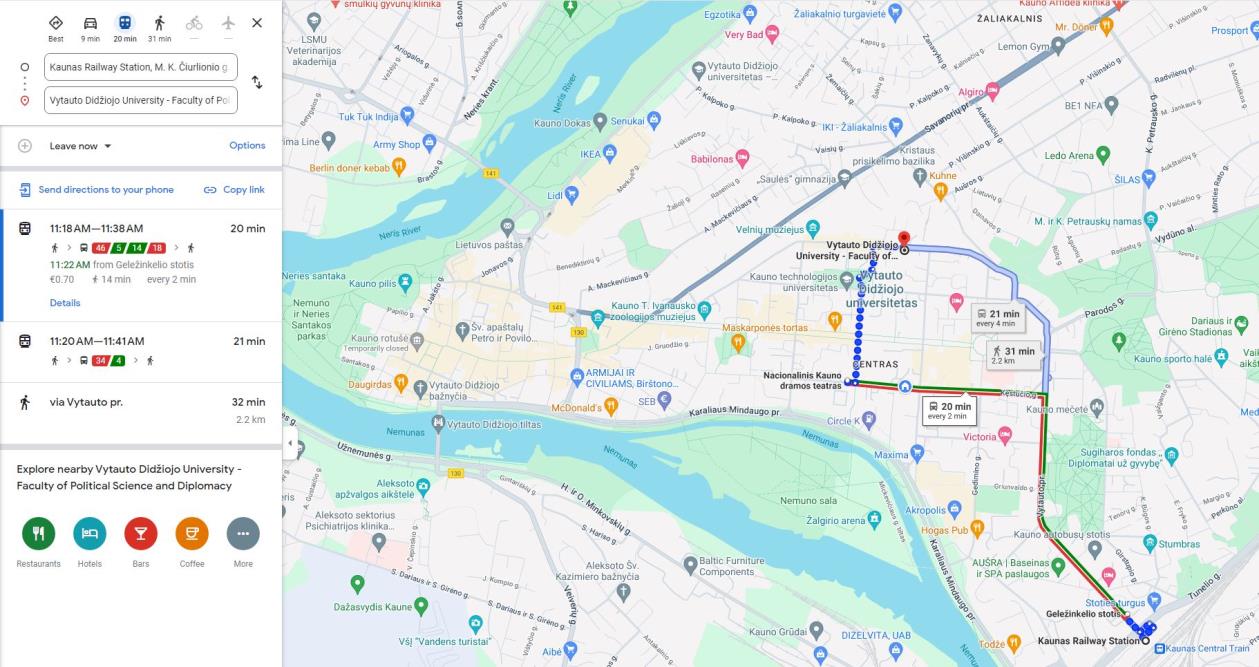
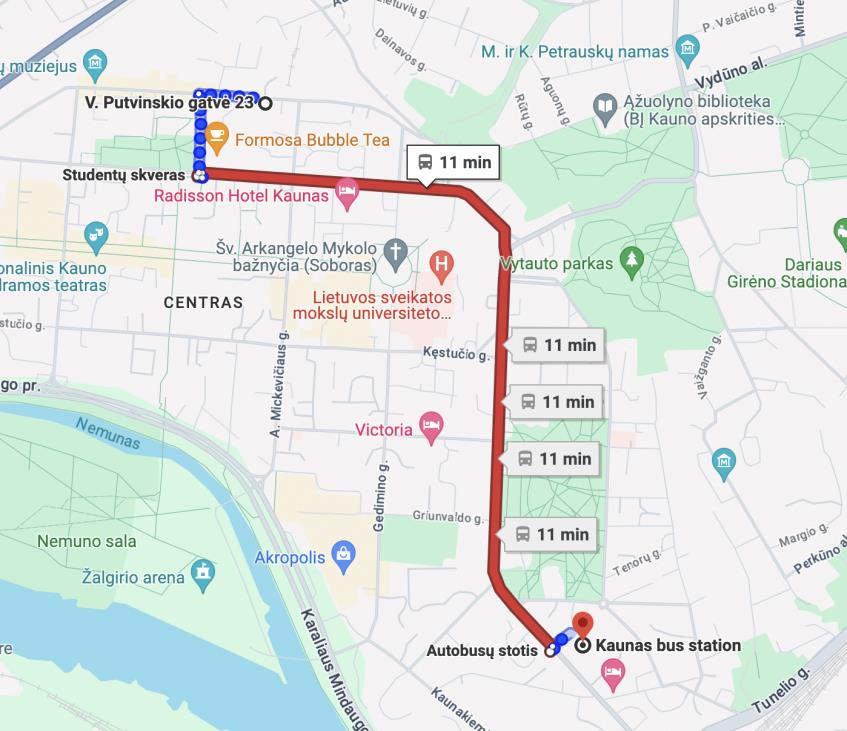
ACCOMMODATION
LIST OF SUGGESTED HOTELS IN KAUNAS
Closest to the University and to pedestrian street Laisvės alėja:
✓ METROPOLIS***
✓ RADISSON HOTEL KAUNAS****
✓ MOXY KAUNAS***
✓ BEST BALTIC KAUNAS****
✓ KAUNAS CITY HOTEL ***
✓ HOF HOTEL****
✓ KAUNAS****
Close to the bus and train station (not far from the University (3 stops by bus) :
✓ IBIS KAUNAS CENTRE***
✓ IBIS STYLES KAUNAS***
✓ VICTORIA HOTEL KAUNAS**** (500 m from Laisvės alėja, 750 m from bus station)
Near the Old Town or in the Old Town (University you may reach on foot or go 2-3 stops by bus):
✓ APPLE ECONOMY **
✓ VILLA KAUNENSIS**
✓ BEST WESTERN SANTAKA**** (100 m from the Old Town,)
✓ DAUGIRDAS****
✓ AMBERTON COZY****
✓ BERMAN HOUSE
More information about accomodation in Kaunas available
Here are the closest hotels to the conference venue:
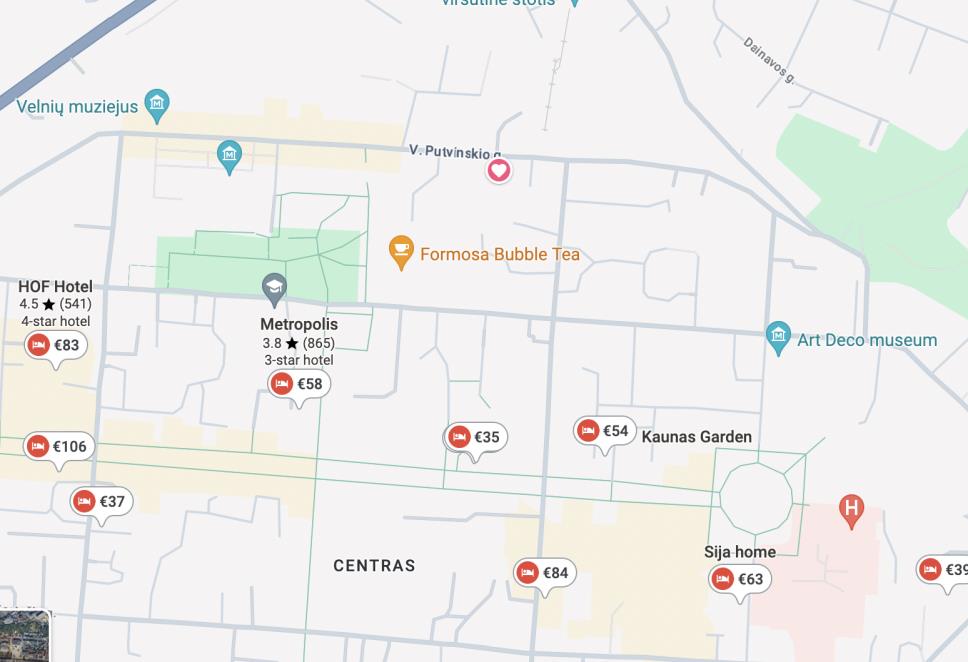
SUGGESTED RESTAURANTS
Vytautas Magnus University lies next to Vienybės (Unity) square where you will quite a few places to grab a coffee, nice breakfast or lunch!
One of the best and affordable places to have lunch is iLunch (K. Donelaičio g. 60, Kaunas, 44248 Kauno m. sav.)
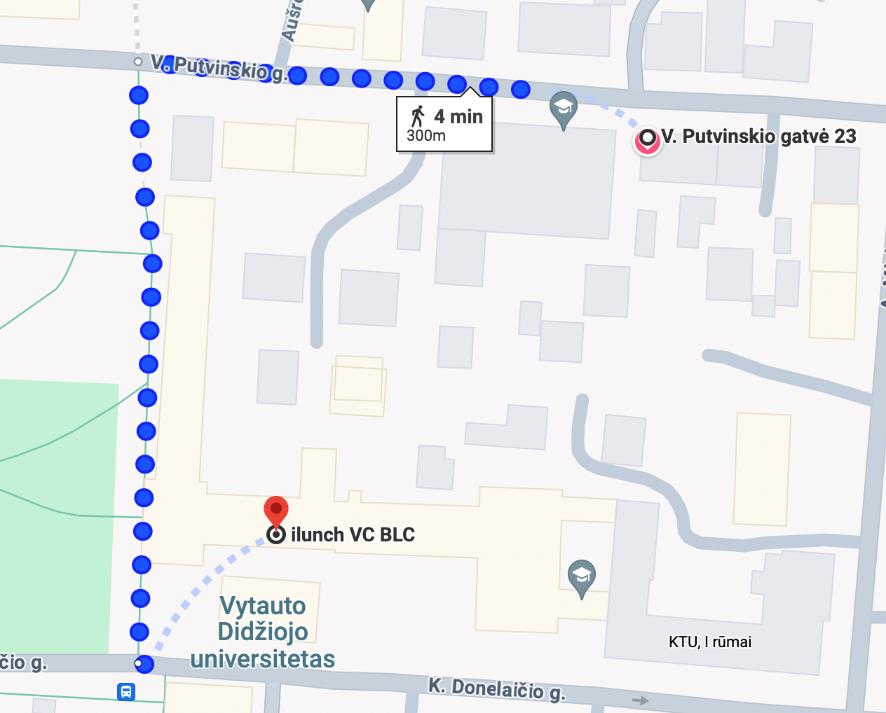
Other places for lunch and dinners next to Vytautas Magnus University:
✓ Mamma Kitchen (V. Putvinskio g. 53, K. Donelaičio g. 62)
✓ Brooklyn Brothers (K. Donelaičio g. 69)
✓ Višta puode (S. Daukanto g. 23)
✓ Paslėpti receptai (Laisvės al. 57)
✓ Restaurant „Putvinskio 48“ (V. Putvinskio 48)
✓ Pas Romano Paolo Bella Italia (Daukanto 14)
✓ Grill London (Laisvės al. 72)
✓ Charlie Pizza (Laisvės al. 68)
✓ Mtevani (Laisvės al. 56)
✓ Talutti tex-mex (Laisvės al. 74)
Of course, do not forget to taste some of our fine Lithuanian traditional dishes. Here are a few places we suggest (mostly in other parts of the city centre):
✓ Bernelių užeiga (K. Donelaičio g. 11, and M. Valančiaus g. 9)
✓ Avilys (Vilniaus gatvė 34)
✓ Bajorkiemis (Kęstučio g. 86)
✓ Miesto sodas City Garden (Laisvės al. 93)
Have a wonderful time and we hope that you’ll enjoy Kaunas!
PRACTICAL INFORMATION FOR CONFERENCE ATENDEES
CONFERENCE VENUE
Vytautas Magnus University
Faculty of Political Science and Diplomacy
V. Putvinskio str. 23
LT-44243 Kaunas, Lithuania
ARRIVAL TO KAUNAS
Kaunas is the second-largest city in Lithuania, situated in the center of the country. It is also at the confluence of Lithuania’s two biggest rivers! Here are the most convenient ways of travelling to Kaunas and getting around the city.
Travelling to Kaunas
By car
Travelling to Kaunas by car is hassle-free from Riga, Warsaw, Vilnius, Klaipeda and pretty much the rest of the cities in the surrounding region. In the central part of Kaunas, parking fees are applicable from 8 am to midnight daily, or from 8 am to 8 pm daily.
By bus
Kaunas Bus Station is one of the most modern in the region – not only it looks great in pictures but is open 24/7 and offers plenty of activities for those waiting for intercity and international buses.
Intercity and international coach services are provided by Kautra, Eurolines, Ecolines, Flixbus, Toks and Lux Express. Check the timetables and buy tickets online.
The bus station is not far from the city center – it takes less than 15 minutes on foot to reach St. Michael, the Archangel (Garrison) Church (also known as Soboras) or Laisvės alėja pedestrian street. Tickets and timetables: www.autobusubilietai.lt
By train
Kaunas is conveniently accessible by train from Vilnius (1 and other cities in Lithuania and abroad, including Warsaw and Krakow. Laisvės alėja, the main street in Kaunas, is just a 15-minute walk from the railway station. For timetables and ticket purchases, it is recommended to check online www.ltglink.lt
By plane
You can fly directly to Kaunas from more than 20 cities in Europe (check the timetables on the website of Kaunas international airport). Kaunas International Airport is located in the central part of the country, 14 km northeast of the Kaunas city centre and 100 km west of the capital Vilnius. Hop in the city bus #29 (its timetable is adjusted to the arrivals schedule) to reach the city centre for the most affordable price – 1 Eur! Regular taxi (we recommend the eTaksi, eTransport, BOLT app, UBER app is also an option, but less popular so it might take a longer waiting time), CITYBEE and BOLT car sharing service are all available at the airport too.
Getting around Kaunas
By public transport
Kaunas is a very walkable city; we suggest you pack your most comfortable shoes. To reach objects in the outskirts of the city (or if it rains, or if you happen to love buses and trolleybuses!), we suggest you use a well-developed network of public transport. Download the Trafi app for real-time traffic and timetables and Žiogas app for purchasing (cheaper) tickets. The latter is super-fast and convenient! There’s also a public transport network website called stops.lt that quite possibly speaks your language, too.
Kaunas city public transport service center is located at Laisvės al. 114, Kaunas (opposite the E. Ožeškienė st. stop)
More information: https://www.visit.kaunas.lt/en/plan/transport/arrival-to-kaunas/
Here is a route to get from Kaunas train station to the conference venue (Vytautas Magnus University). You can walk on foot, but it will take about 30 minutes. There are quite a few buses that can take you to our university. The same route and buses go from Kaunas Bus Station, because it is a few minutes away from the train station. You can purchase a ticket from the bus
driver (cash only!) or download Žiogas mobile app. All the routes and schedule of buses are available on Google Maps.


ACCOMMODATION
LIST OF SUGGESTED HOTELS IN KAUNAS
Closest to the University and to pedestrian street Laisvės alėja:
✓ METROPOLIS***
✓ RADISSON HOTEL KAUNAS****
✓ MOXY KAUNAS***
✓ BEST BALTIC KAUNAS****
✓ KAUNAS CITY HOTEL ***
✓ HOF HOTEL****
✓ KAUNAS****
Close to the bus and train station (not far from the University (3 stops by bus) :
✓ IBIS KAUNAS CENTRE***
✓ IBIS STYLES KAUNAS***
✓ VICTORIA HOTEL KAUNAS**** (500 m from Laisvės alėja, 750 m from bus station)
Near the Old Town or in the Old Town (University you may reach on foot or go 2-3 stops by bus):
✓ APPLE ECONOMY **
✓ VILLA KAUNENSIS**
✓ BEST WESTERN SANTAKA**** (100 m from the Old Town,)
✓ DAUGIRDAS****
✓ AMBERTON COZY****
✓ BERMAN HOUSE
More information about accomodation in Kaunas available
Here are the closest hotels to the conference venue:

SUGGESTED RESTAURANTS
Vytautas Magnus University lies next to Vienybės (Unity) square where you will quite a few places to grab a coffee, nice breakfast or lunch!
One of the best and affordable places to have lunch is iLunch (K. Donelaičio g. 60, Kaunas, 44248 Kauno m. sav.)

Other places for lunch and dinners next to Vytautas Magnus University:
✓ Mamma Kitchen (V. Putvinskio g. 53, K. Donelaičio g. 62)
✓ Brooklyn Brothers (K. Donelaičio g. 69)
✓ Višta puode (S. Daukanto g. 23)
✓ Paslėpti receptai (Laisvės al. 57)
✓ Restaurant „Putvinskio 48“ (V. Putvinskio 48)
✓ Pas Romano Paolo Bella Italia (Daukanto 14)
✓ Grill London (Laisvės al. 72)
✓ Charlie Pizza (Laisvės al. 68)
✓ Mtevani (Laisvės al. 56)
✓ Talutti tex-mex (Laisvės al. 74)
Of course, do not forget to taste some of our fine Lithuanian traditional dishes. Here are a few places we suggest (mostly in other parts of the city centre):
✓ Bernelių užeiga (K. Donelaičio g. 11, and M. Valančiaus g. 9)
✓ Avilys (Vilniaus gatvė 34)
✓ Bajorkiemis (Kęstučio g. 86)
✓ Miesto sodas City Garden (Laisvės al. 93)
Have a wonderful time and we hope that you’ll enjoy Kaunas!
